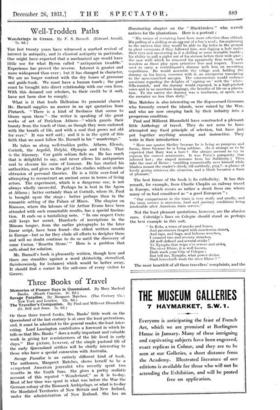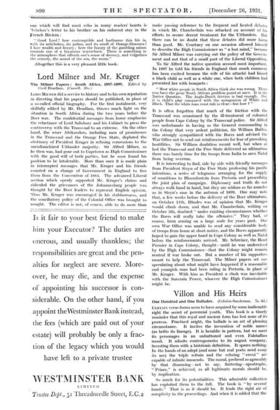Three Books of Travel
Memories of Pioneer Days in Queensland. By Mary Macleod
Banks. (Heath Cranton. 3s. 6d.)
The Traveller's Companion. By Paul and Millicent Bloomfield. (G. Bell and Sons. 7s. 6d.)
Or these three travel books, Mrs. Banks' little work on the Queensland of the last century is at once the least pretentious, and, it must be admitted to the general reader, the least inter- esting. Lord Lamington contributes a foreword in which he tells us that Mrs. Banks " does a really important and valuable work in giving her reminiscences of the life lived in early days." Her picture, however, of the simple pastoral life of the early Queensland settlers will be chiefly interesting to those who have a special connexion with Australia.
Savage Paradise is an entirely different kind of book. The authoress, Margaret Matches, shows herself to be a competent American journalist who recently spent two months in the South Seas. She gives a pretty realistic account of this reputed " Wonderland," as it is to-day. Most of her time was spent in what was before the War the German colony of the Bismarck Archipelago, or what is to-day the Mandated Territories of New Britain and New Ireland, under the administration of New Zealand. She has an
illuminating chapter on the " Blackbirders " who recruit natives for the plantations. Here is a portrait :
" His means of recruiting have been more effective than ethical. His pulling of a shilling or an egg out of a boy's wool ; his explaining to the natives that they would be able to dig holes in the ground to plant cocoanuts if they followed him, and digging a hole under their eyeS and uncovering in it a shilling or some desirable bauble ; his ability to pull a piglet out of his stetson before their wide gaze ; the ease with which he removed his apparently firm teeth, such wonders as these play upon primitive fear and respect. Towers used to carry a ventriloquist's dummy with him on recruiting expeditions. Ho would assemble the village and, holding the dui/my on his knees, converse with it, an interpreter translating to the open-mouthed savages. The conversation would embrace questions regarding the delights of signing on ' with the white- fella-mastah, and the dummy would expound, in a high-pitched voice and in no uncertain language, the benefits of life on a planta- tion. To the native the dummy was a tambaran, or spirit, ra.d the recruiter no less than deity."
Miss Matches is also interesting on the dispossessed Germans who formerly owned the islands, were ruined by the War, and who are now creeping back by their industry into a prosperous condition.
Paul and Millicent Bloomfield have constructed a pleasant little Anthology of travel. They do not seem to have attempted any fixed principle of selection, but have just put together anything amusing and instructive. They write in their introduction :
" Here one quotes Shelley because he is being so pompous and funny, there because he is being sublime. (Is it strange or to be expected that Mary was a bore ? She always seemed to try to express the correct sentiments. It was Percy's pomposity that infected her ; she stayed immune from his Sublimity.) Then take the case of Heine : tumbling romantically over himself while blushes mount the reader's cheek, till suddenly, ping 1—a phrase of lovely genius retrieves the situation, and a blush becomes a flush of pleasure."
The best future of the book is its catholicity. It has this remark, for example, from Charlie Chaplin on railway travel in Europe, which comes as rather a shock from one whom many of us had considered as " a good European " :
" Our compartment in the train is very stuffy and smelly, and the train service is atrocious, food and sanitary conditions being intolerable after American train. service."
Not the least pleasant quotations, however, are the abusive ones. Coleridge's lines on Cologne should stand as perhaps the best example in this sort.
" In Kedn, a town of monks and bones,
And pavements fanged with murderous stones, And rags, and hags, and hideous wenches, I counted two and seventy stenches, All well defined and several stinks Ye Nymphs that reign o'er sewers and sinks, The river Rhine, it is well known, Doth wash your City of Cologne ; But tell me, Nymphs, what power divine Shall henceforth wash the river Rhine ? "
The most heartfelt of all these travellers' complaints, and the
one which will find most echo in many readers' hearts is 'reliehov's letter to his brother on his enforced stay in the French Riviera :
" Good Lord ! how contemptible and loathsome this life is, with its artichokes, its palms, and its smell of Orange-blossoms ! I love wealth and luxury ; here the luxury of the gambling saloon reminds one of a luxurious watercloset. There is something in the atmosphere that offends one's sense of decency, and vulgarises the scenery, the sound of tho sea, the moon."
Altogether this is a very pleasant little book.

































 Previous page
Previous page